 Ares III, the third manned mission to Mars, is cut short by the approach of a severe Martian dust storm whose winds pose a serious risk of toppling their escape vehicle. The crew is ordered inside, but flying debris lowers visibility to zero, and strikes the crew’s botanist, astronaut Mark Watney. Believing Watney is dead, Commander Lewis and her crew blast off from Mars, leaving Watney behind. But Watney isn’t dead: impaled by debris, which also damaged his spacesuit, he makes it back to the crew’s abandoned habitat dome and performs an emergency surgery on himself. He then turns his attention to survival: the Ares IV mission isn’t scheduled to arrive for another four years, so he has to be able to eat, breathe, drink, and stay safe until then. His skills are uniquely suited to growing food, but no one has ever grown crops on Mars. In the meantime, it’s weeks before NASA realizes Watney is still alive, and months before they alert the returning Ares III crew to this news…but it will still be years before Watney can be rescued, if he can stay alive on Mars that long.
Ares III, the third manned mission to Mars, is cut short by the approach of a severe Martian dust storm whose winds pose a serious risk of toppling their escape vehicle. The crew is ordered inside, but flying debris lowers visibility to zero, and strikes the crew’s botanist, astronaut Mark Watney. Believing Watney is dead, Commander Lewis and her crew blast off from Mars, leaving Watney behind. But Watney isn’t dead: impaled by debris, which also damaged his spacesuit, he makes it back to the crew’s abandoned habitat dome and performs an emergency surgery on himself. He then turns his attention to survival: the Ares IV mission isn’t scheduled to arrive for another four years, so he has to be able to eat, breathe, drink, and stay safe until then. His skills are uniquely suited to growing food, but no one has ever grown crops on Mars. In the meantime, it’s weeks before NASA realizes Watney is still alive, and months before they alert the returning Ares III crew to this news…but it will still be years before Watney can be rescued, if he can stay alive on Mars that long.
screenplay by Drew Goddard
based on the novel by Andy Weir
directed by Ridley Scott
music by Harry Gregson-Williams
Cast: Matt Damon (Mark Watney), Jessica Chastain (Melissa Lewis), Kristen Wiig (Annie Montrose), Jeff Daniels (Teddy Sanders), Michael Pena (Rick Martinez), Sean Bean (Mitch Henderson), Kate Mara (Beth Johanssen), Sebastian Stan (Chris Beck), Aksel Hennie (Alex Vogel), Chiwetel Ejiofor (Vincent Kapoor), Benedict Wong (Bruce Ng), Mackenzie Davis (Mindy Park), Donald Glover (Rich Purnell), Nick Mohammed (Tim Grimes), Chen Shu (Zhu Tao), Eddy Ko (Guo Ming), Enzo Cilenti (Mike Watkins), Jonathan Aris (Brendan Hatch), Gruffudd Glyn (Jack), Naomi Scott (Ryoko), Geoffrey Thomas (U.S. President), Yang Haiwen (Chinese Flight Director), Narantsogt Tsogtsaikhan (Wen Jiang), Brian Caspe (Timer Controller), Matt Devere (Satcon), Mike Kelly (Launcher Interface), Szonja Oroszlan (Launch Control), Greg de Cuir Jr. (Capcom), Mark O’Neal (Guidance), Peter Linka (Telemetry), Declan Hannigan (Comms), Peter Schueller (NASA Break Room Worker), Waleska Latorre (Vincent’s Secretary), Frederik Pleitgen (CNN Reporter), Nikolett Barabas (Reporter 1), Karen Gagnon (Reporter 2), Lili Bordan (Reporter 3), Charlie Gardner (Robert Lewis), Nora Horich (Vogel’s Wife), Kamilla Fatyol (Marissa Martinez), Yang Liu (Chinese Translator), Xue Xuxing (Ming’s Secretary), Richard Rifkin (JPL Store Man), Nicholas Wittman (JPL White Room Worker), Balazs Medveczky (JPL White Room Worker), Ben O’Brien (JPL Pathfinder Team), Scott Alexander Young (JPL Pathfinder Team), Jason Ryan (JPL Pathfinder Team), James Dougherty (JPL Pathfinder Team)
Notes: The Mars Pathfinder mission and its Sojourner rover were launched in 1996, and landed in July 1997, arguably becoming the first space mission widely followed on the internet. Sojourner was the forerunner to the rovers that now explore the real Martian landscape.
LogBook entry and review by Earl Green
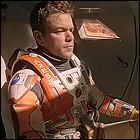 Review: Quite simply one of the best space exploration films ever made, The Martian is a meticulous adaptation of Andy Weir’s novel, and even though it boasts an all-star cast (and a director who’s a star in his own right), the movie version of The Martian never feels like it’s being “Hollywood-ized”. The situations are mostly realistic, the science is right on the nose, and in Matt Damon we have a leading man who portrays his character’s emotional arc as competently as he narrates his scientific thinking and his logic.
Review: Quite simply one of the best space exploration films ever made, The Martian is a meticulous adaptation of Andy Weir’s novel, and even though it boasts an all-star cast (and a director who’s a star in his own right), the movie version of The Martian never feels like it’s being “Hollywood-ized”. The situations are mostly realistic, the science is right on the nose, and in Matt Damon we have a leading man who portrays his character’s emotional arc as competently as he narrates his scientific thinking and his logic.
There’s no small irony in The Martian quickly eclipsing Gravity at the box office; rather than being a series of disaster-movie setpieces, it’s a set of problems that Watney (Damon) has to solve, and through his constant “log entries”, he shows his mental math. There 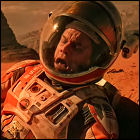 are a few scary incidents for him, though none worse than the emergency surgery he has to perform on himself early in the movie, but The Martian isn’t trying to be the unrelenting action movie that Gravity was – and it would seem audiences appreciated that.
are a few scary incidents for him, though none worse than the emergency surgery he has to perform on himself early in the movie, but The Martian isn’t trying to be the unrelenting action movie that Gravity was – and it would seem audiences appreciated that.
NASA and JPL appreciated The Martian too, offering a nearly unprecedented level of cooperation since this movie didn’t destroy the entire space program in two hours. (There’s the small matter of Jeff Daniels’ NASA administrator being an inflexible bureaucrat who makes at least one or two really bad calls in the course of the story, for what he clearly thinks are the best reasons, but that seems to be a minor consideration; the closest thing this movie has to a real villain is the unyielding cold hard numbers of physics.) The Martian is a love letter to good engineering and math skills and rigorous training.
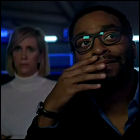 The cast is excellent across the board, though most of the emotion on display comes courtesy of the ground controllers on Earth, who have the time and luxury of worrying about a public relations backlash (as opposed to Watney, who has to set that baggage aside to get down to the business of growing potatoes on Mars). There was some protest early on about the cast being “whitewashed”; if that’s the case, at least the actors in those roles are good ones.
The cast is excellent across the board, though most of the emotion on display comes courtesy of the ground controllers on Earth, who have the time and luxury of worrying about a public relations backlash (as opposed to Watney, who has to set that baggage aside to get down to the business of growing potatoes on Mars). There was some protest early on about the cast being “whitewashed”; if that’s the case, at least the actors in those roles are good ones.
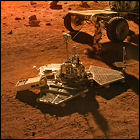 The production design is absolutely meticulous (veterans of JPL’s Pathfinder project reportedly marveled at the fact that, yes, you could theoretically plug something into that socket and power up the lander again). The “modern” space hardware (the movie is set in the 2030s) isn’t so far out that it’s improbable, and even Watney’s numerous duct tape repairs aren’t that far-fetched. One minor thing which I didn’t think about until later: Ridley Scott opted to avoid worrying about depicting Martian gravity (or, for that matter, air pressure) as lower than Earth’s. If you get through the whole movie without worrying about that, you’re proof of why Scott didn’t have to worry about it.
The production design is absolutely meticulous (veterans of JPL’s Pathfinder project reportedly marveled at the fact that, yes, you could theoretically plug something into that socket and power up the lander again). The “modern” space hardware (the movie is set in the 2030s) isn’t so far out that it’s improbable, and even Watney’s numerous duct tape repairs aren’t that far-fetched. One minor thing which I didn’t think about until later: Ridley Scott opted to avoid worrying about depicting Martian gravity (or, for that matter, air pressure) as lower than Earth’s. If you get through the whole movie without worrying about that, you’re proof of why Scott didn’t have to worry about it.
 Other things that aren’t quite as depicted: neither Johnson Space Center nor the Caltech-based JPL campus are as opulent as shown here, though again, the movie is set in the 2030s, and maybe by then both will have benefitted from several successive budget windfalls from sympathetic Congresses (okay, now that is science fiction). The helping hand from the Chinese space program is also nearly unthinkable at present, with numerous seemingly intractible legal barriers preventing any technology transfer or exchange between NASA and the Chinese. Could the scenario in The Martian happen? It may seem far-fetched now – but no doubt Apollo-Soyuz seemed far-fetched in the 1960s (and it, too, was presaged by a movie: 1969’s Marooned, starring Gregory Peck and Gene Hackman, itself based on a novel by Martin Caidin).
Other things that aren’t quite as depicted: neither Johnson Space Center nor the Caltech-based JPL campus are as opulent as shown here, though again, the movie is set in the 2030s, and maybe by then both will have benefitted from several successive budget windfalls from sympathetic Congresses (okay, now that is science fiction). The helping hand from the Chinese space program is also nearly unthinkable at present, with numerous seemingly intractible legal barriers preventing any technology transfer or exchange between NASA and the Chinese. Could the scenario in The Martian happen? It may seem far-fetched now – but no doubt Apollo-Soyuz seemed far-fetched in the 1960s (and it, too, was presaged by a movie: 1969’s Marooned, starring Gregory Peck and Gene Hackman, itself based on a novel by Martin Caidin).
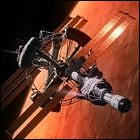 The Martian is one of the best space exploration movies in ages, a somewhat rarified genre that has the disadvantage of being dominated by a heavy hitter from 1968 (2001: a space odyssey), setting the bar to which everyone else must rise. But The Martian has no killers among the crew, no aliens, no homicidal supercomputers, and no over-the-top, everything-that-was-ever-in-Earth-orbit-just-turned-into-deadly-shrapnel disaster scenarios. It’s one guy against the numbers, against physics, against the limitations of what he has on hand, and against the urge to give up. And that is what makes The Martian a great movie, regardless of genre.
The Martian is one of the best space exploration movies in ages, a somewhat rarified genre that has the disadvantage of being dominated by a heavy hitter from 1968 (2001: a space odyssey), setting the bar to which everyone else must rise. But The Martian has no killers among the crew, no aliens, no homicidal supercomputers, and no over-the-top, everything-that-was-ever-in-Earth-orbit-just-turned-into-deadly-shrapnel disaster scenarios. It’s one guy against the numbers, against physics, against the limitations of what he has on hand, and against the urge to give up. And that is what makes The Martian a great movie, regardless of genre.

